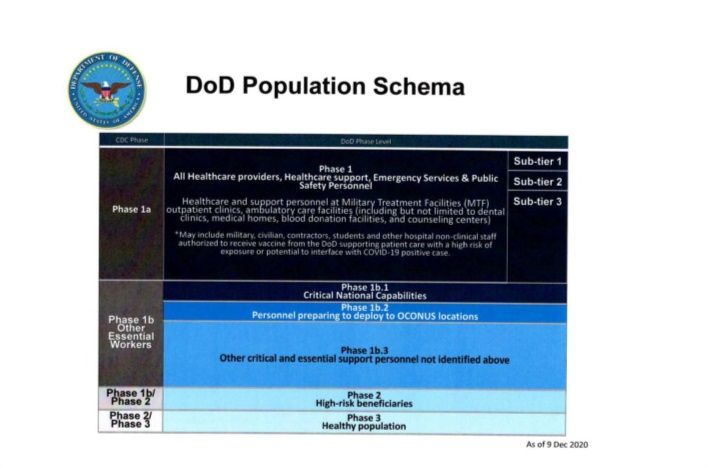As government contractors, you have been caught between the Scylla and Charybdis of the COVID-19 pandemic. On the one hand, you have been required to continue to perform your government contracts to ensure the safety and protection of the nation and on the other you have had to address not only state and local government lockdowns and restrictions, but also questions about how best to keep your employees safe from the threat of infection each day.
While the Federal government approves vaccines and allocates doses to the States, the States and their local governments are responsible for the rules and regulations that address prioritization and phased-in distribution of those vaccines. Different States have differing rules, priorities, and requirements for distribution.
The Department of Defense (DoD) is trying to increase the availability of the vaccine to those on the front lines in the Defense Industrial Base (DIB). On January 7, 2021, the Honorable Ellen Lord, Under Secretary of Defense issued a DoD COVID-19 Vaccine Allocation and Distribution Policy Memorandum to the DIB (Lord Memorandum), providing guidance and standards for contractor employees' eligibility to receive vaccines as they become available. This policy for allocation and distribution follows on the Under Secretary of Defense Coronavirus Disease 2019 Vaccine Guidance, dated December 7, 2020, Supplemental Guidance for Providing DoD Coronavirus Disease 2019 Vaccines to DoD Contractor Employees and Select Foreign Nationals, dated December 31, 2020, and DoD Instruction 6205.02, DoD Immunization Program, dated July 23, 2019, as well as applicable law. Under this policy and guidance, DoD may offer and administer the vaccination of DIB employees directly supporting DoD at DoD installations or in an operational environment "in accordance with the . [below] DoD COVID-19 vaccine population schema (e.g., healthcare providers/support personnel, personnel preparing to deploy), and the terms of applicable contracts." The policy and guidance also provides that other DIB contract employees providing "mission-critical capabilities" also will be assessed under eligibility standards to receive the vaccine as doses become available.
The Lord Memorandum provides that DoD will continue to evaluate personnel eligibility and prioritization to include other DIB contractor personnel "to ensure continuity of our national security mission and to support total force public health efforts." DoD's efforts to make vaccines available for the broader DIB is important as the DIB is recognized to be part of the country's critical infrastructure. According to Ms. Lord, DoD's efforts include seeking to leverage State vaccine allocations for eligible DIB contractor employees as well.

At present, DoD is in discussions with the Department of Health and Human Services (HHS), the Centers for Disease Control (CDC), and State public health officials to advocate for prioritized vaccination of DIB personnel. Notably, DoD is asking DIB contractors to engage with their State and local public health authorities to advocate for appropriate prioritization of the vaccine to their personnel.
Some Key Takeaways
- Check your contracts to determine whether you have personnel performing mission-critical activities. Priority will be provided to those whose employees who are directly supporting DoD on military installations and in operational environments.
- Review your contracts to determine whether and to what extent they require a certain level of in-person performance, or have other terms that may provide a reason for you to seek prioritization for your contractor personnel.
- Communicate with your State and local health care authorities to determine the current state of prioritization for government contractor personnel.
- Consider engaging your contracting officer and local authorities in a dialogue to determine if your personnel will be eligible for prioritized vaccination.
- Even if your contracts don't address these matters or provide you with priority, more vaccines are rolling out and the situation is evolving so keep abreast of the news.
The content of this article is intended to provide a general guide to the subject matter. Specialist advice should be sought about your specific circumstances.
